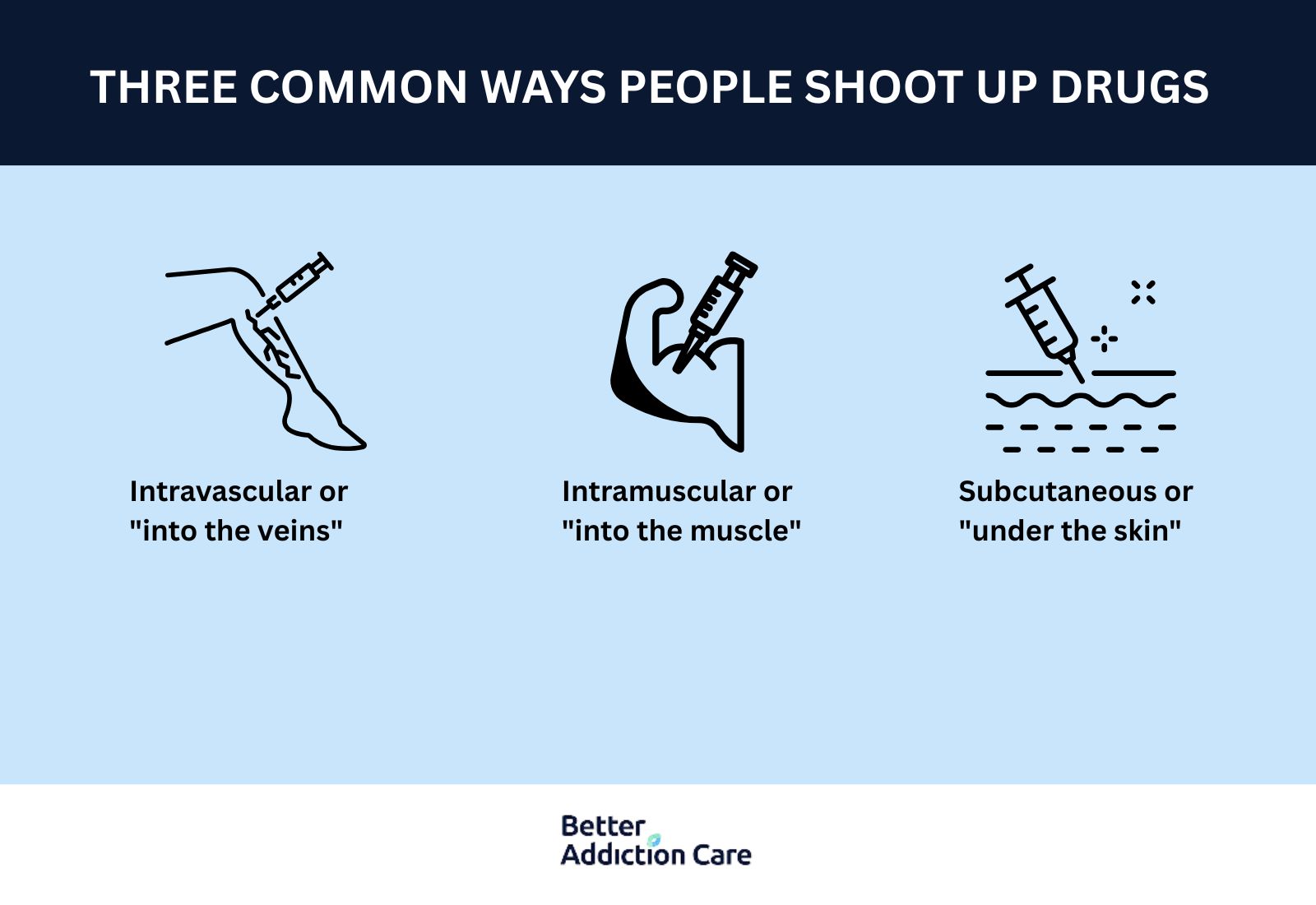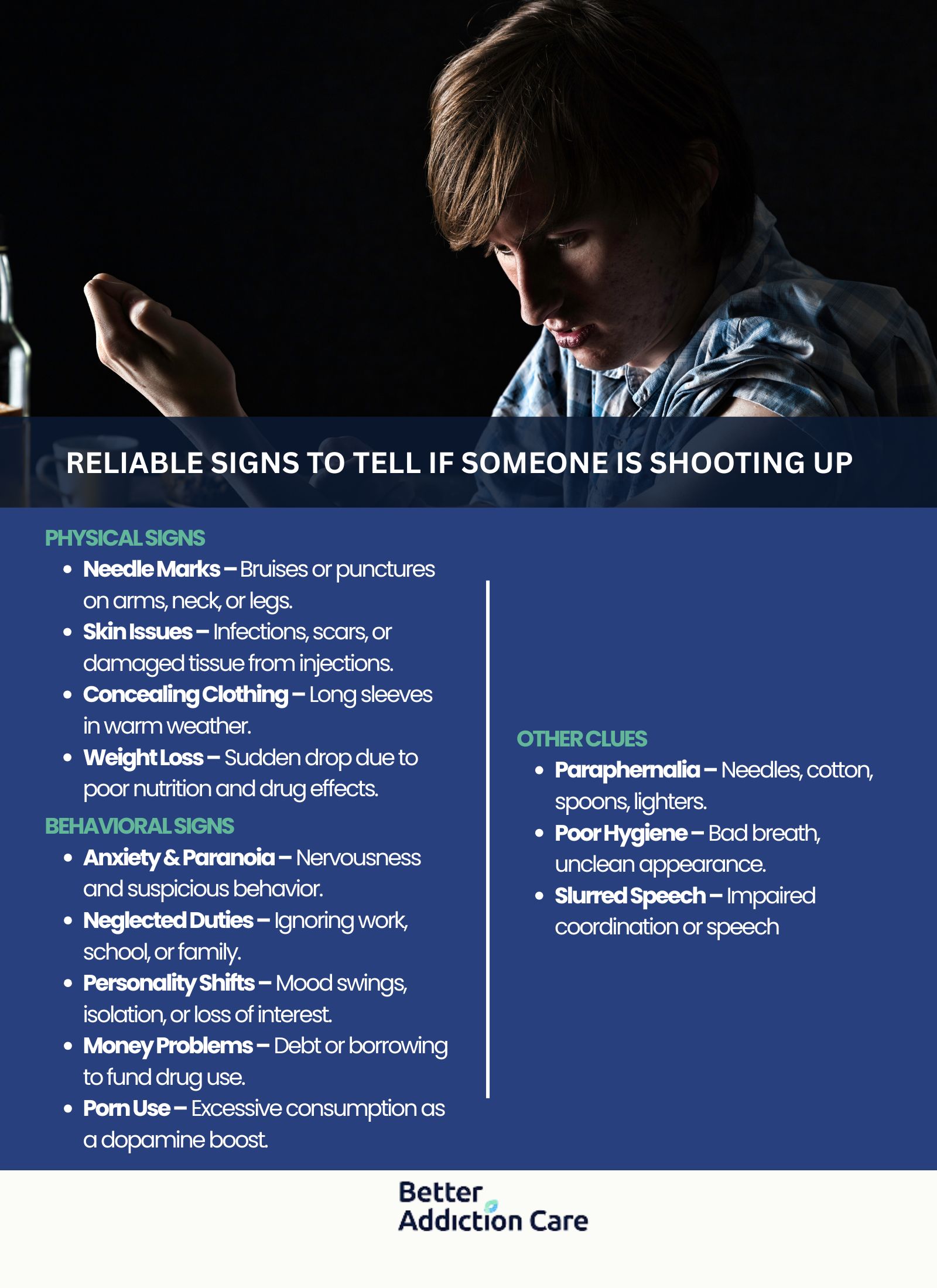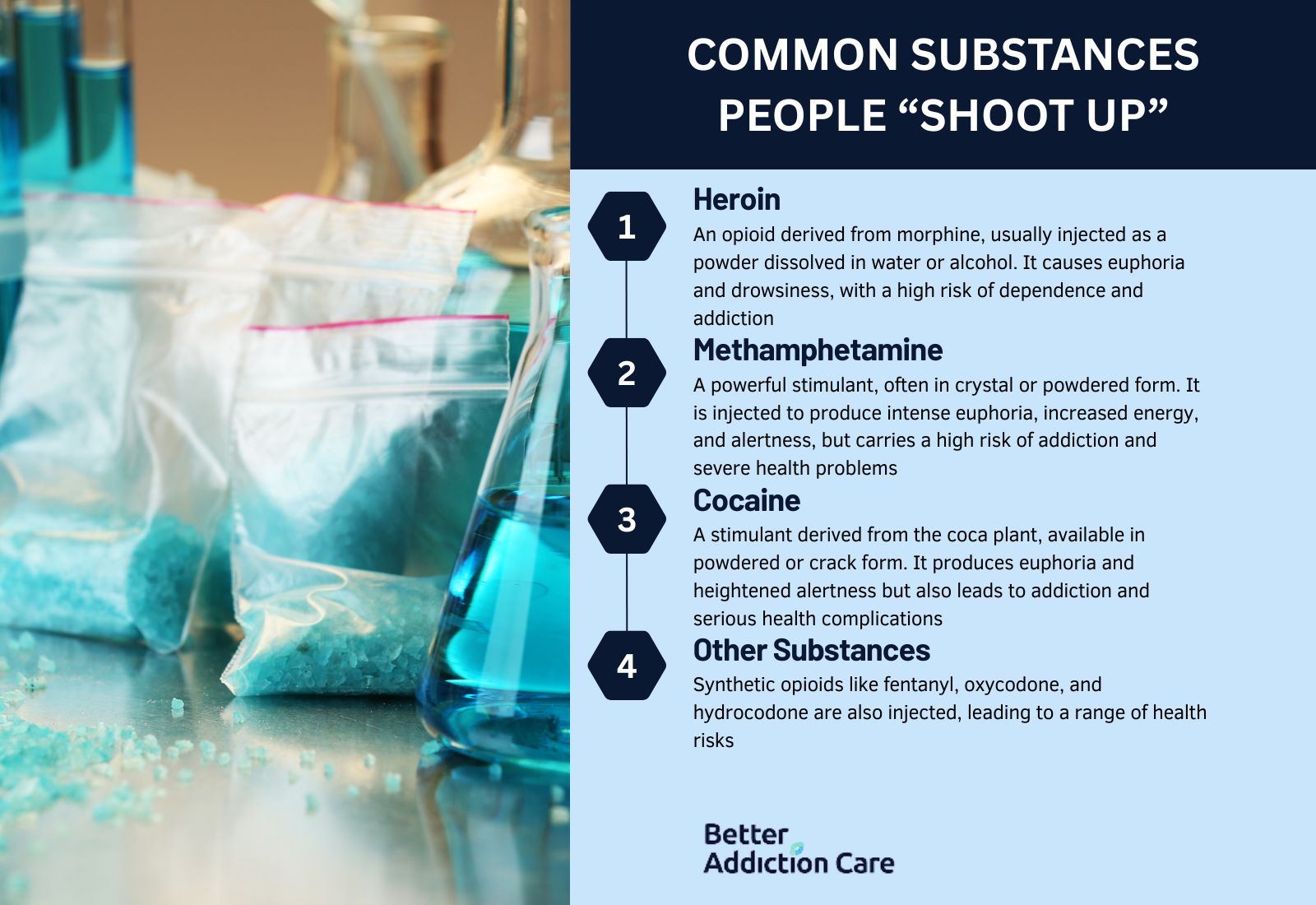How to Tell if Someone is Shooting Up Drugs?
To tell if someone is shooting up drugs, look for physical signs like track marks (dark, round bruises along veins), skin infections, abscesses, sudden weight loss, and inappropriate clothing that conceals arms regardless of the weather. Behavioral indicators include increased anxiety and paranoia, failure to meet responsibilities, personality changes, social isolation, and financial problems.

Additional signs involve the presence of drug paraphernalia such as needles, syringes, spoons, cotton balls, lighters, and plastic vials.
Neglected personal hygiene, slurred speech, and impaired coordination also suggest intravenous drug use. Recognizing these signs early enables prompt intervention that saves lives, as IV drug use poses serious health risks, including infection, overdose, and transmission of diseases like HIV and hepatitis.
According to the CDC, HIV prevalence among persons who inject drugs (PWID) in major U.S. metropolitan areas has remained stagnant at 7% from 2015 to 2018. Among HIV-negative PWID in 2018, 57% were tested for HIV in the previous 12 months, indicating a significant gap in regular testing.
If you suspect that your loved one struggles with intravenous drug use, Better Addiction Care offers comprehensive treatment programs tailored to address the unique challenges associated with this addiction. These programs encompass medical detox, therapy, and counseling, all aimed at helping individuals overcome physical dependency and underlying psychological issues. By providing personalized care, Better Addiction Care fosters a safer and healthier path to recovery, ensuring individuals receive the support they need to reclaim their lives.
What Does Shooting Up Mean?
Shooting up means injecting drugs directly into the body using a syringe or needle. This method requires transforming solid drugs into a liquid form so they are drawn into a syringe for injection.
The "high" from shooting up is much faster compared to ingesting drugs orally. The substance enters directly into the bloodstream, circulating quickly as the heart pumps and reaching the brain almost immediately. This intense rush explains why some users do not remove the needle after injection.

There are three common ways people shoot up drugs:
-
Intravascular or "into the veins"
-
Intramuscular or "into the muscle"
-
Subcutaneous or "under the skin"
All these injection methods are known for producing instantaneous and intense effects on the user.
What Are The Reliable Signs To Tell if Someone is Shooting Up?

The reliable signs to tell if someone is shooting up are physical indicators like track marks on arms or hidden body areas, skin infections, sudden weight loss, and skin popping, behavioral changes including increased anxiety, neglected responsibilities, personality shifts, and social isolation, as well as environmental clues such as drug paraphernalia, cotton balls, and inappropriate clothing regardless of weather.
Here are the reliable signs to tell if someone is shooting up drugs:
Physical Signs of IV Drug Use
Physical signs of drug use include needle marks, skin popping, skin infection, weight loss, and strange clothing choices.
Here are some physical indicators of Intravenous drug use:
Presence of Needle Marks
The track marks are obvious signs of injection. These are round, dark bruises that go more lightly moving away along the person’s arm or poorly-healed puncture wounds.
Here are some common body spots where needle marks are visible:
-
Forearm (inner and outer)
-
Biceps
-
Neck
-
Calves
Track marks appear as long, round, or oblong marks covering the area over blood vessels. Most individuals use veins in the crooks of their arms, the soft inner part where the elbow bends, as injection sites. Over time, these sites become painful, prompting drug users to seek veins in other body parts, such as legs, hands, and feet. Users often attempt to conceal these marks, resorting to less visible locations, such as the groin.
Skin Infection
Skin infections arise from infected needle marks and drug side effects, with poor hygiene due to behavioral drug effects serving as a common cause of deteriorating skin health.
Other reasons for skin infection include:
-
Use of dirty, non-sterilized needles and syringes.
-
Injection of vasoconstrictor drugs like heroin or cocaine, which tighten and constrict blood vessels in the skin.
-
Damaging the skin tissue surrounding the injection site.
-
Infecting the skin with “saliva” when the person licks the needle before use.
Skin Popping
Skin popping occurs when inexperienced intravenous drug users inadvertently inject substances into their muscles, resulting in the formation of scar tissue and other complications.
“Peculiar” Clothing to Conceal Puncture Marks
"Peculiar" clothing refers to the choice of attire that intravenous drug users wear to hide visible track marks from their drug use. Many users opt for long-sleeved shirts and long pants, even in warm weather, to conceal the evidence of their injections and avoid drawing attention to their drug use. This behavior stems from a desire for privacy, fear of judgment, and the need to maintain a semblance of normalcy in their daily lives.
Weight Loss
Weight loss occurs when individuals inject addictive stimulants, which generate excessive energy that leads to significant calorie burning, disrupted sleep patterns, and irregular eating habits. As a result, it is common for intravenous drug users to experience sudden and noticeable weight loss.
Behavioral Signs of IV Drug Use
Behavioral signs of IV drug use are increased anxiety, paranoia, personality changes, failing to meet daily responsibilities, social isolation, and financial problems.
Here are the common behavioral signs of IV drug use:
Increased Anxiety and Paranoia
Regular IV drug use significantly alters the nervous system due to the intense pharmacological effects of injected drugs. Individuals using IV drugs exhibit increased anxiety, defensiveness, combativeness, and paranoia due to extreme drug stimulation.
Failure to Meet Commitments and Responsibilities
Frequent drug injection raises tolerance levels, leading to cravings for larger doses. This escalation results in addiction, distracting individuals from fulfilling responsibilities at work, school, or home.
Change in Personality
Large doses of IV drugs reduce inhibition, altering personality, actions, and behaviors. Individuals become more irritable or reclusive due to excessive drug use. Some individuals experience constant sleepiness and exhaustion due to restlessness and lack of sleep caused by stimulant surges in the bloodstream. Users also lose interest in sports or hobbies, changing habits to spend more time consuming drugs.
Social Isolation
To avoid detection, some IV drug users withdraw from family and friends. They avoid social gatherings due to embarrassment over physical changes resulting from addiction. This social isolation fosters feelings of loneliness, leading to serious mental health risks such as depression. In some cases, users do not isolate themselves but instead form bonds with other drug users, treating them as a “new family” who understands their reasons for drug use. This companionship distances them further from their original family and friends.
Financial Problems
IV drug addiction distracts individuals from functioning effectively at work and in business, leading to financial hardships. The high cost of drugs often results in individuals accumulating loans to sustain their addiction.
Increased Consumption of Pornography
This trend applies to all forms of drug use, including oral and nasal consumption. Pornography provides a dopamine boost that complements the pleasure derived from drug injection. Consequently, IV drug users often indulge in excessive consumption of obscene media.
Other Signs that Someone is Shooting Up
Here are more telltale signs of how to spot someone using intravenous drugs:
-
Large amounts of dark-colored cotton around someone’s place.
-
Presence of drug paraphernalia at home or car (needles, syringes, lighters, spoons, plastic vials, liquid containers, etc)
-
Halitosis (due to neglect of personal hygiene)
-
Slurred speech and impaired coordination.
Why Do People Shoot Up Drugs?
People shoot up drugs primarily because injection provides a faster, more intense high than other consumption methods. Despite being more painful and harmful than snorting or swallowing substances, intravenous drug use delivers the substance directly into the bloodstream, creating an immediate effect.
Most people don't start their drug use by injecting. Instead, they typically progress to shooting up as their tolerance increases from regular oral or nasal drug use, making these methods feel less effective over time. When oral or intranasal administration no longer produces the desired high, users often turn to injection to achieve the intense rush they've become dependent on.
Social factors also play a significant role in why people shoot up drugs. Peer influence within certain social circles normalizes injection drug use, with some groups portraying it as edgy or desirable. Individuals seeking acceptance within these communities adopt injection practices to gain social approval, despite the increased health risks.
What Common Substances Do People “Shoot Up”?

People commonly "shoot up" three main substances: heroin, methamphetamine, and cocaine.
According to Novak, S. P.’s 2011 study, ‘Comparing Injection and Non-Injection Routes of Administration for Heroin, Methamphetamine, and Cocaine Uses in the United States’, 7% of past-year heroin, methamphetamine, and cocaine users injected these drugs. Heroin was the most injected drug (53%), followed by methamphetamine (43%) and cocaine (40%).
Heroin
Heroin, an opioid drug derived from morphine, acts as an addictive depressant on the nervous system. This substance appears in powdered form, which users dissolve in water or alcohol for injection or other methods of consumption. Symptoms of heroin use lead to a range of physical and psychological effects, including euphoria, drowsiness, and a high potential for dependence and addiction.
Methamphetamine
Methamphetamine, a highly addictive stimulant, appears in crystal or powdered form. The powder easily dissolves in water or alcohol for injection, delivering a rapid boost of dopamine that contributes to its extreme addictive potential. Symptoms of methamphetamine use include intense euphoria, increased energy, and heightened alertness, but the drug also carries significant risks of dependence and severe health consequences.
Cocaine
Cocaine, a stimulant drug derived from the leaves of the native coca plant, appears in powdered or crack form. Symptoms of cocaine use include increased energy, heightened alertness, and euphoria, but the drug also poses significant risks of addiction and various health complications.
Other substances people inject include synthetic opioids like fentanyl, oxycodone, and hydrocodone.
What Are the Dangers of Shooting Up Drugs?
The dangers of shooting up drugs are skin infections, compromised blood circulation, bone deterioration, respiratory complications, vein collapse, blood-borne disease transmission, overdose risk, nutritional deficiencies, reproductive issues, needle fragments in the bloodstream, and heart inflammation.
These serious health consequences affect multiple body systems and lead to both acute emergencies and chronic conditions. Injectable drug use presents significantly higher risks than other methods of consumption due to the direct introduction of substances and potential contaminants into the bloodstream.
What To Do If You Know Someone is Shooting Up?
If you know someone is shooting up, you should take immediate action while providing emotional support and connecting them with professional help. Recognizing signs of IV drug use is the first step, but knowing how to respond appropriately is crucial for their recovery.
When someone you care about is shooting up drugs, approaching them with compassion is essential. Many people struggling with injection drug use want to stop but fear withdrawal symptoms, health complications, and social stigma. Providing consistent emotional support alongside access to medical care and addiction treatment gives them the best chance at recovery.
Remember that addiction is a treatable condition. With proper professional healthcare, determination from the person using drugs, and support from loved ones, recovery is possible. The path is challenging, but positive outcomes happen every day.
If you discover someone is actively shooting up and experiencing medical distress, call 911 immediately. For non-emergency situations where someone needs addiction treatment for IV drug use, contact Better Addiction Care to find appropriate rehabilitation centers near you that specialize in treating injection drug addiction, including facilities in states like California, Illinois, Texas, and Florida.
What Types Of Treatment Are Most Effective For People Who Inject Drugs?
The most effective types of treatment for people who inject drugs include a comprehensive approach addressing both physical dependency and psychological factors. These treatments begin with medically supervised detoxification to manage withdrawal symptoms, which are particularly intense for IV drug users.
Following drug detox, evidence-based therapies like cognitive-behavioral therapy (CBT) and contingency management help individuals identify triggers and develop coping strategies. Medication-assisted treatment (MAT) using methadone, buprenorphine, or naltrexone proves especially beneficial for opioid injection users by reducing cravings and preventing relapse. Treatment programs that include counseling for co-occurring mental health disorders, life skills training, and ongoing support groups provide the comprehensive care needed for long-term recovery success.
Can Local Drug Rehab Facilities Help With Intravenous Drug Use?
Local drug rehab facilities help with intravenous drug use by providing specialized treatment programs designed to address the unique challenges associated with this form of substance abuse. These facilities offer a combination of medical detoxification, counseling, and therapy to help individuals overcome their dependency on intravenous drugs. The structured environment and professional support ensure that patients receive the care they need to manage withdrawal symptoms, identify triggers, and build healthier coping mechanisms.
Finding the right local drug and alcohol rehab facilities is a crucial step in the recovery journey. These centers are equipped to provide the comprehensive care and support necessary to overcome intravenous drug use and achieve lasting recovery.
Treatment Centers in Virginia
 123
123
 123
123
 123
123

